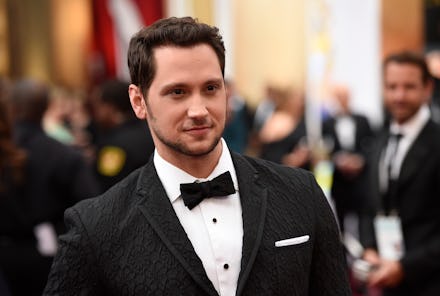Matt McGorry Had The Perfect Response to People Who Support #AllLivesMatter

"Black lives matter. White lives matter. All lives matter," former Gov. Martin O'Malley (D- Md.) told an audience at the progressive activist conference Netroots Nation this weekend, according to Time. While O'Malley was booed off the stage and even later issued an apology, he's hardly the first public figure to state that "all lives matter." In fact, the sentiment — that focusing on black lives erases the importance of others — is one supporters of the #BlackLivesMatter movement often face.
It's also a notion that actor and emerging activist Matt McGorry thoughtfully destroyed Friday on Twitter. After McGorry tweeted words of support to protestors organizing in honor of the anniversary of Eric Garner's death, a follower countered his use of the hashtag #BlackLivesMatter by posing the question, "all lives matter surely?"
In response, McGorry thoroughly explained the distinction that #BlackLivesMatter is a true movement, whereas #AllLivesMatter is almost universally a means of attacking others.
Though his response is certainly helpful, McGorry is hardly the first to highlight why #AllLivesMatter is a destructive distraction from #BlackLivesMatter. Others have explained how black people have long been systematically differentiated from other people in the United States, which makes activism singling them out not only acceptable, but wholly necessary.
"One reason the chant 'Black Lives Matter' is so important is that it states the obvious but the obvious has not yet been historically realized," gender theorist and philosopher Judith Butler wrote to the New York Times in January. "So it is a statement of outrage and a demand for equality, for the right to live free of constraint, but also a chant that links the history of slavery, of debt peonage, segregation, and a prison system geared toward the containment, neutralization and degradation of black lives, but also a police system that more and more easily and often can take away a black life in a flash all because some officer perceives a threat."
Statistics back Butler's claim: Although black Americans make up 13% of the U.S. population, they comprise 26% of police shooting victims, according to the Center on Juvenile and Criminal Justice. There are 1.5 million black men "missing" in America due to early death or incarceration, according to the New York Times.
Beyond historical inequality, others have explained how "all lives matter" ignores the current experiences of black Americans.
"Saying 'all lives matter' causes erasure of the differing disparities each group faces," Julia Craven wrote in the Huffington Post. "Saying 'all lives matter' is nothing more than you centering and inserting yourself within a very emotional and personal situation without any empathy or respect."
But while #BlackLivesMatter centers on the experiences of black Americans, there is plenty of room in the movement for solidarity and allyship, as McGorry has modeled with his act of support. However, this allyship must be approached conscientiously and respectfully.
"Standing with us does not mean telling us how we should feel about our community's marginalization," Craven wrote. "Standing with us means being with us in solidarity without being upset that this is for OUR PEOPLE — and wanting recognition for yours in this very specific context ... Justice is not applied equally, laws are not applied equally and neither is our outrage."
As McGorry and many others have explained, the phrase "all lives matter" causes harm by ignoring our country's history and perpetuation of racism. "Whether it's conscious or unconscious, you're contributing to society's racial issues if you're responding with #AllLivesMatter," McGorry wrote on Instagram. "#BlackLivesMatter doesn't mean other lives don't."